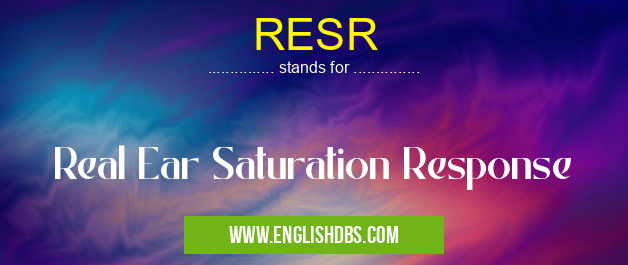What does RESR mean in UNCLASSIFIED
RESR (Real Ear Saturation Response) is a measurement technique used in audiology to determine the sound pressure level (SPL) at which the ear canal resonates. This information is essential for fitting hearing aids and other assistive listening devices.

RESR meaning in Unclassified in Miscellaneous
RESR mostly used in an acronym Unclassified in Category Miscellaneous that means Real Ear Saturation Response
Shorthand: RESR,
Full Form: Real Ear Saturation Response
For more information of "Real Ear Saturation Response", see the section below.
How RESR Works
The RESR is measured by placing a small probe microphone in the ear canal and playing a series of pure tones. The SPL of each tone is gradually increased until the microphone detects a resonance in the ear canal. This resonance is caused by the natural shape and size of the ear canal, and it occurs at a specific frequency.
Importance of RESR
Knowing the RESR is important for several reasons:
- Hearing Aid Fitting: The RESR helps audiologists determine the optimal output level for hearing aids. This ensures that the hearing aids are providing the maximum benefit without causing discomfort or distortion.
- Assistive Listening Devices: RESR measurements can also be used to optimize the settings on assistive listening devices, such as FM systems and personal amplification devices.
- Research and Development: RESR data is valuable for researchers and manufacturers who are developing new hearing technologies.
Essential Questions and Answers on Real Ear Saturation Response in "MISCELLANEOUS»UNFILED"
What is Real Ear Saturation Response (RESR)?
RESR is a measurement of the sound pressure level (SPL) produced in the ear canal of a hearing aid user when the hearing aid is producing a specific output SPL. It is measured using a probe microphone inserted into the ear canal.
Why is RESR important?
RESR is important because it provides information about the loudness and clarity of sound that a hearing aid user is experiencing. It can be used to assess the effectiveness of a hearing aid fitting and to adjust the settings of the hearing aid to optimize performance.
How is RESR measured?
RESR is measured using a probe microphone inserted into the ear canal. The hearing aid is placed on the ear and set to produce a specific output SPL. The probe microphone measures the SPL in the ear canal.
What factors affect RESR?
RESR is affected by a number of factors, including the output SPL of the hearing aid, the gain and frequency response of the hearing aid, the shape and size of the ear canal, and the presence of any earwax or other obstructions.
How is RESR used to assess hearing aid performance?
RESR can be used to assess the effectiveness of a hearing aid fitting by comparing the measured RESR to the desired RESR. The desired RESR is based on the hearing aid user's individual hearing loss and listening preferences. If the measured RESR is significantly different from the desired RESR, it may indicate that the hearing aid is not fitted properly or that the settings need to be adjusted.
Final Words: RESR is a crucial measurement technique in audiology that provides important information about the ear canal's acoustic response. By understanding the RESR, audiologists can optimize the fitting of hearing aids and other assistive listening devices, ensuring that individuals with hearing loss receive the best possible care.
